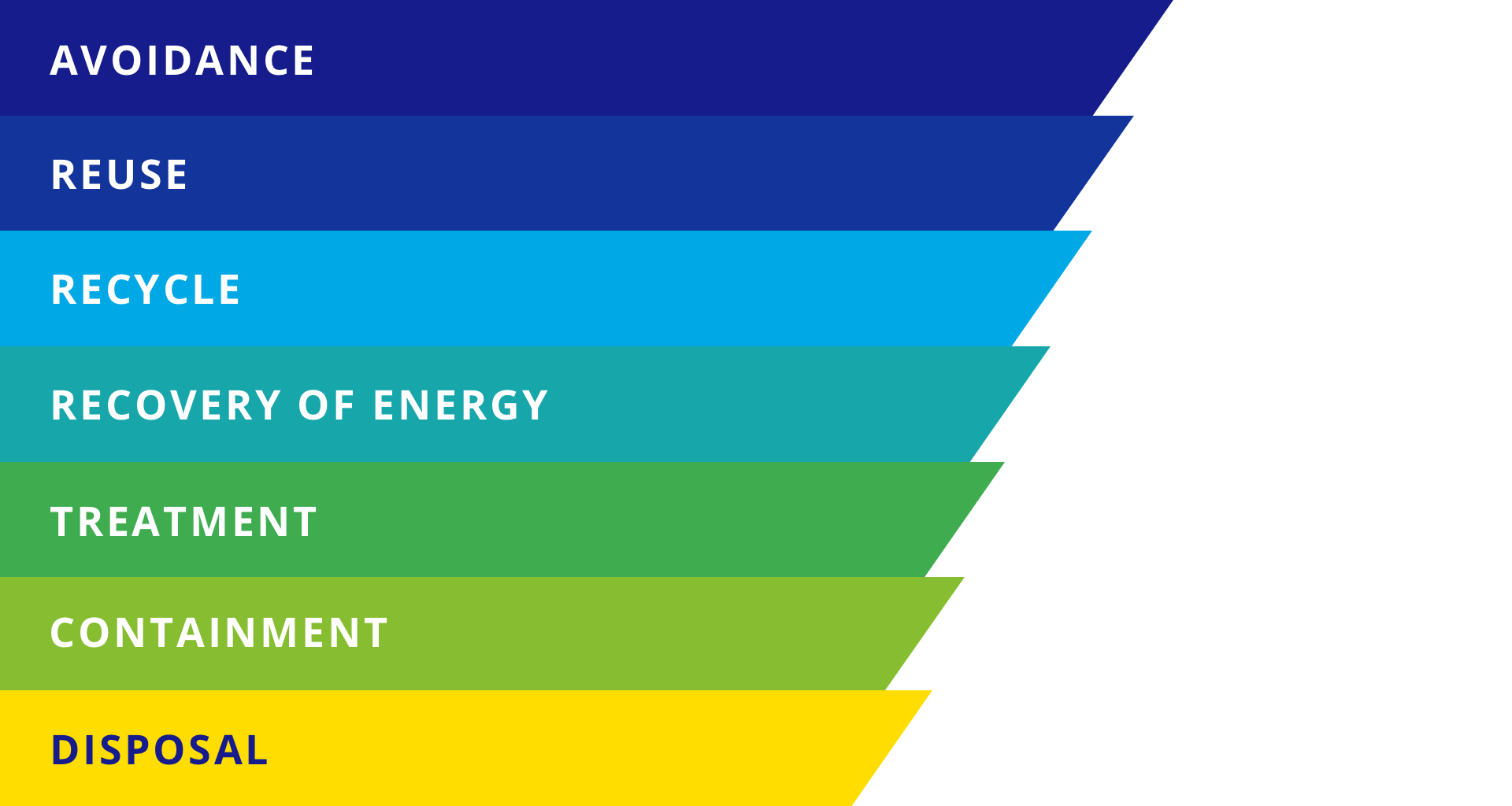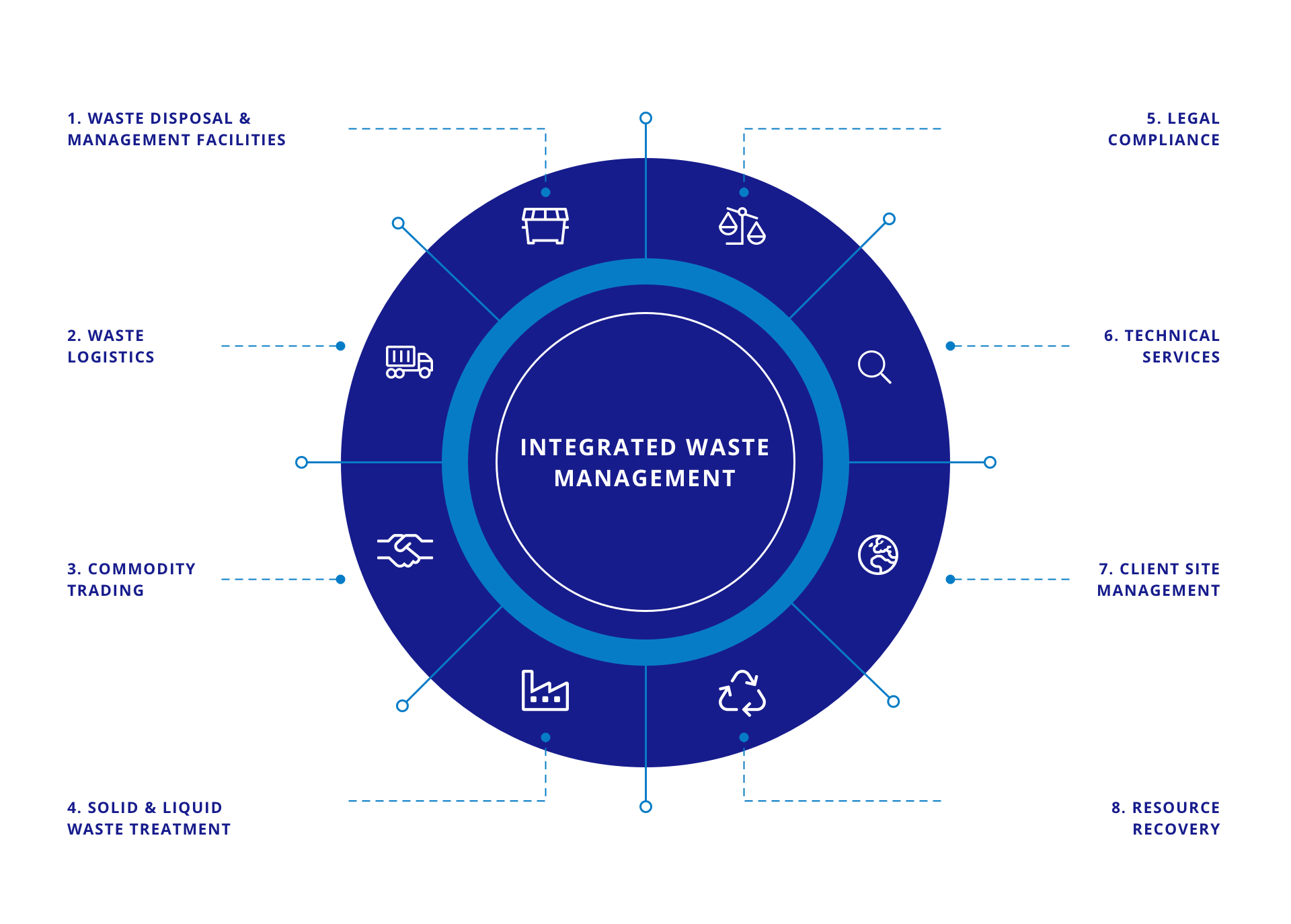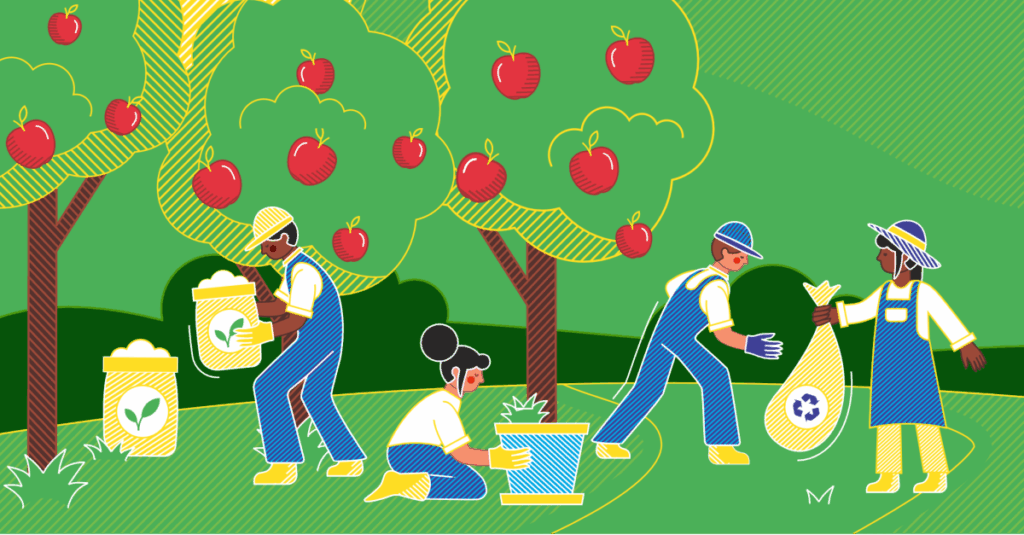All people have the right to a safe, clean, healthy & sustainable environment.
Integrated Waste Management
What is waste management and why is it important?
Waste management includes all the activities and processes involved in managing waste from its creation to its final re-use or disposal. Waste typically refers to the physical aspect of various materials which can be in solid, liquid or gas form. When incorporating the circular economy mindset, waste can also refer to other resources such as energy, water use and human/ mechanical involvement.
The types of actions involved in waste management include the separation, sorting, collection, transportation, processing, treatment and disposal of waste materials. This is usually waste produced by human activity. These activities need to take place in line with waste-related laws and regulations to ensure compliance and the safe handling and process of all materials.
Waste management deals with a wide variety of waste which comes from industrial, biological, commercial and household sources. Some types of waste are hazardous and pose a serious threat to human health and the environment. Even non-hazardous waste left untreated or disposed of incorrectly, creates health and environmental risks.
Why is it important?
The global realisation of the dire need to protect our natural resources and ecosystems has placed a strong focus on the importance of implementing sustainable and environmentally responsible waste management practices.
Effective waste management is critical to prevent negative environmental, social and economic impacts as well as to protect our ecosystems and natural resources to provide a healthy and safe environment in which all life forms can thrive.
Sustainability means that responsible businesses are morally and legally bound to manage their waste products in the most effective way possible to comply with more stringent regulations and demonstrate good corporate citizenship. By adopting the global hierarchy of waste management principles to minimise, reduce, recycle, recover, treat and dispose of waste safely and ethically, not only helps divert valuable materials from landfills but also supports the creation of jobs, innovative technologies, a healthier planet and an environmentally astute culture all round.
Why you need a waste management plan
The purpose of a waste management plan is to ensure legal compliance, drive environmentally sound business practices and provide guidance on how to minimise, re-use, recycle, handle, contain and dispose of all waste generated. There is no one-size-fits-all approach to waste management, hence a waste management plan specific to each operation is needed to manage waste effectively and efficiently.
A standard waste management plan includes but is not limited to the following elements:
- Clear objectives and targets aligned to company and environmental strategy;
- Key performance indicators and measures to prevent pollution and environmental impact;
- The types and quantities of waste generated;
- Targets for waste minimisation through waste reduction, re-use, recycling and recovery;
- Programmes and projects to minimise the generation of waste and the disposal of waste to landfill;
- Actions on how to handle and manage each waste type;
- Reduction and phasing out of the use of certain materials and substances;
- Opportunities to reduce waste generation through changes to packaging, product design or production processes;
- Project plan / timelines for implementing changes in the plan;
- Reporting methods and methodologies;
- Continuous improvement plans.
Do’s of waste management
- Identify all the waste types you generate
- Make sure you understand and comply with the relevant waste regulations
- Manage your waste effectively
- Care about the environment
- Contact a waste professional for guidance
- Keep learning about waste and exploring ways to reduce, re-use and recycle your waste
Dont’s of waste management
- Ignore your waste
- Think it is someone else’s problem
- Treat it all the same
- Give up!
How much does waste management cost?
The cost of waste management in South Africa has generally been underpriced, which means that the costs of managing waste are not fully appreciated or understood by consumers and industry, and waste disposal to landfill is preferred over other options.
The implementation of ongoing new regulations governing waste, the ongoing bans of certain types of waste from landfill disposal, consumer pressure to buy from more environmentally conscious companies, zero waste to landfill strategies and rising statutory and operating costs are all contributing factors to compliant waste solutions.
It is also important to understand the true cost of waste management. Elements such as waste sampling, analysis and classification, labour, equipment, transport, handling, blending, preparation, treatment and/or disposal, compliance, monitoring and management should be factored into the total cost of waste management.
In order to manage waste and the costs associated thereto more comprehensibly, companies which implement waste management strategies and plans, tend to not only reduce their costs in the longer term but also achieve more sustainable environmental and social goals.
Hierarchy of Waste Management
The ultimate aim of waste management is to protect the planet and its natural resources through the maximum extraction of the benefits from materials processed and then to manage waste in the best possible way so that the minimum amount of waste is produced.
All products and services have environmental impacts, from the extraction of raw materials for production to manufacturing, distribution, consumption and final disposal.
An Integrated and Circular Economy Approach to Waste Management
An integrated and holistic approach to waste management is critical to ensure the most value is realised from an economic, social and environmental perspective. Interwaste aims to assist its clients transition their business mindset to the circular economy way of thinking. The circular economy offers significant opportunities to truly deliver on more inclusive economic growth, which includes job opportunities, entrepreneurship, innovation and positive environmental practices that are required for sustainable growth.
Hierarchy of Waste Management Continued
This is why an integrated approach to waste management is required to ensure the most resource-efficient and environmentally conscious decisions are made and that waste disposal is the last option for consideration as opposed to the standard linear model where waste is only considered at the end of the value chain and disposal thereof becomes the simplest solution.
The global hierarchy of waste management is a methodology used to deliver sustainable benefits as the process not only considers and protects the environment but incorporates resource and energy consumption from the most preferred to least favourable actions. It prioritises waste handling methodologies in order to reduce waste volumes to landfill facilities.
The waste management hierarchy is shown diagrammatically in the form of an upside down pyramid. It depicts the progression of a material / resource / product through different stages of waste management. Benefits from applying this process include reduced waste, the prevention of greenhouse gas emissions, the use of less pollutants, conservation of energy and resources, the creation of jobs and development of environmentally friendly technologies and solutions.
Steps in the hierarchy include:
- Avoidance
- Reduction and reuse
- Recycling
- Recovery
- Treatment
- Containment
- Disposal
An Integrated and Circular Economy Approach to Waste Management
The circular economy is a model that aims to strip out all unnecessary waste materials, energy losses and related carbon emissions across supply chains and through integration and innovation, promotes closing gaps to allow materials, energy and resources to be re-used into the system.
This is an alternative way of operating to the traditional “make-use-dispose” linear approach. It is a more sustainable eco-cycle which puts the environment and its precious resources at the heart of the business. It is achieved through re-looking and integrating processes across the value chain such as long-term design and planning, careful sourcing, maintenance, repair, reuse, remanufacturing, refurbishing, recycling and upcycling.
How it works
Managing waste effectively and compliantly involves an iterative, holistic process. Interwaste offers its clients a full service solution to assist in achieving their environmental and sustainability goals.
Our integrated approach includes:
- Understanding a client’s business, its strategy and waste types
- Assisting with waste sampling, classification, auditing and categorising the various waste generated
- Designing and implementing innovative, compliant and cost effective solutions for each waste type
- Providing clients with skilled staff and the relevant equipment / containers to separate and manage their waste on their premises
- Identifying waste and resource recovery solutions for various materials
- Offering solid and liquid waste treatment services for client on their sites or through one of our own treatment processes
- Collecting and transporting waste utilising a wide mix of specialised waste handling equipment and logistics vehicles
- Ensuring the safe handling, treatment and disposal of waste through specialised processes and licensed facilities.
Case studies & insights
Address
2 Brammer Street, Industries East, Germiston South, Gauteng
Postal
PO Box 382, Germiston, 1400, Republic of South Africa
Contact Us
+27 11 323 7300 (Customer Care)
+27 87 803 0909 (Sales)
info@interwaste.co.za





